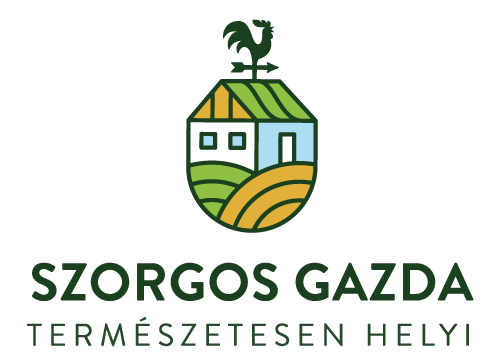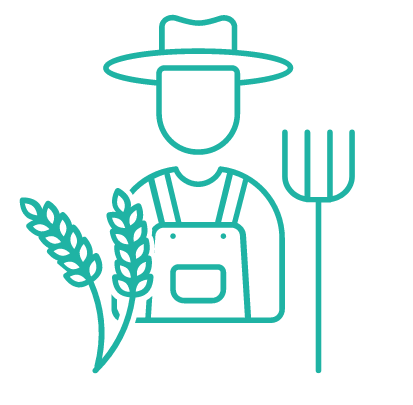Started as a small family garden, today it has grown into a 1-hectare business, where they farm with a chemical-free, bio-intensive method, and produce not only their produce, but also pickles, jams, syrups and creams.
With a dream in their hearts and a little courage in their pockets, they left the hustle and bustle of the city behind six years ago and moved to a small farm. They had a single goal: to recreate the ancient, close-to-nature harmony that our ancestors knew so well. They believed in the miracle of creation – the moment when nothing becomes something. When a seed is planted in the earth and life springs from it: a plant, a flower, a crop. They also believed that freedom begins where we can shape our lives with our own hands.
Thus began the story of their self-sufficient family farm. There are two of them, Gergely and Melinda Gulyás, both with a degree in horticulture, and since then they have been working heart and soul to ensure that the treasures of their land bring health and joy not only to them, but also to their customers. Every square metre of their one hectare of land has become their home, where they farm using chemical-free, bio-intensive methods.
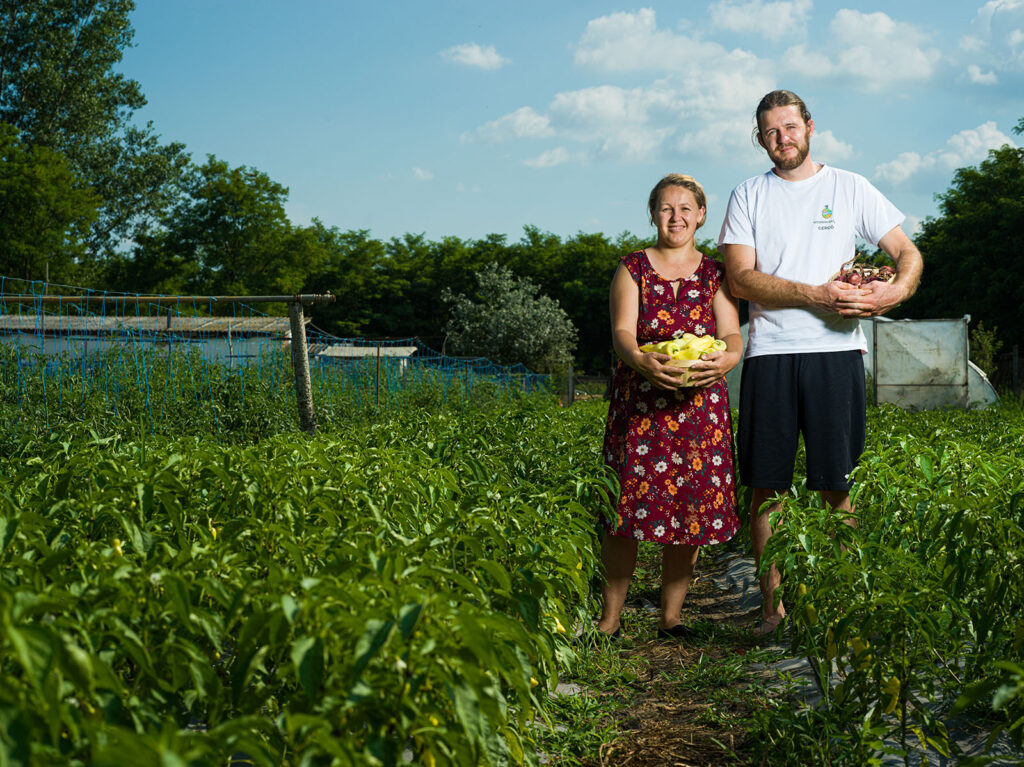
Their three-year-old daughter is already part of this world. She is often seen picking fresh raspberries or crisp vegetables from the garden with her tiny hands. She is their number one ‘taster’ – and perhaps their most honest critic. They know that what they give her is the best they can provide: nutrient-dense, natural, seasonal food that is meant to be eaten the way nature intended.
There is no room for primary produce on their farm. In the winter, for example, customers won’t find tomatoes at their farm – but what they do offer is always the best of the season. Their crops are cared for with crop rotation, natural control methods, and each plant is treated as if it were a member of the family in need of individual care.
When they do have a crop left over from the markets, they don’t let it go to waste. They are used to make jams, syrups, pickles and vegetable creams, without any preservatives to keep the flavours pure and genuine. They also put these homemade delicacies on the table in their own kitchen, while living their daily lives in the company of three dogs, three cats and a few pets.
For them, farming is more than a job: it’s a bridge to their customers. They meet them at markets, talk to them, share their experiences.
In Budapest and its surroundings they have four selling points: the market on the Roman coast, the Pancs-Gasztroplacc, the Zugló Bread Community and the market in Göd.
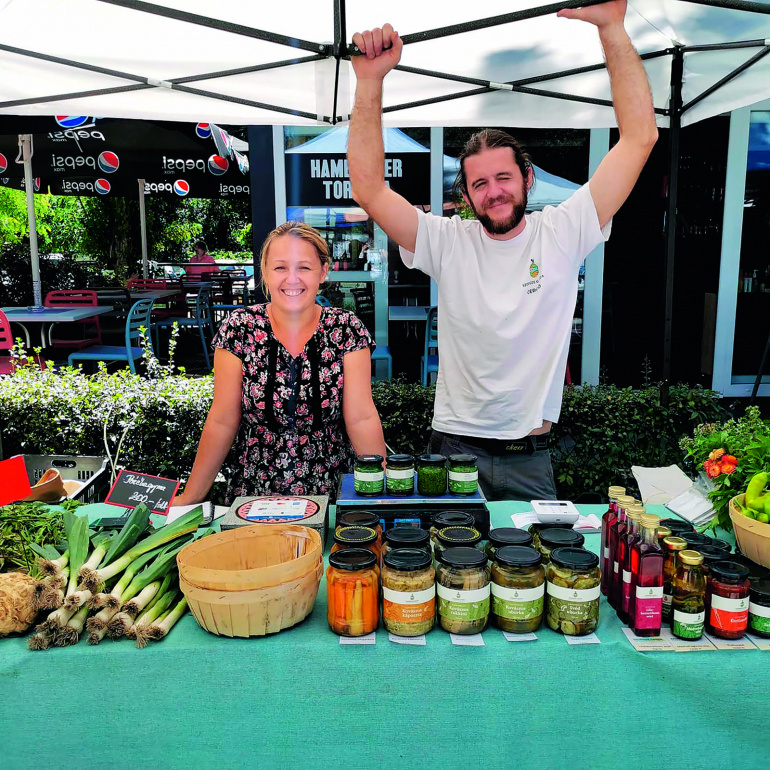
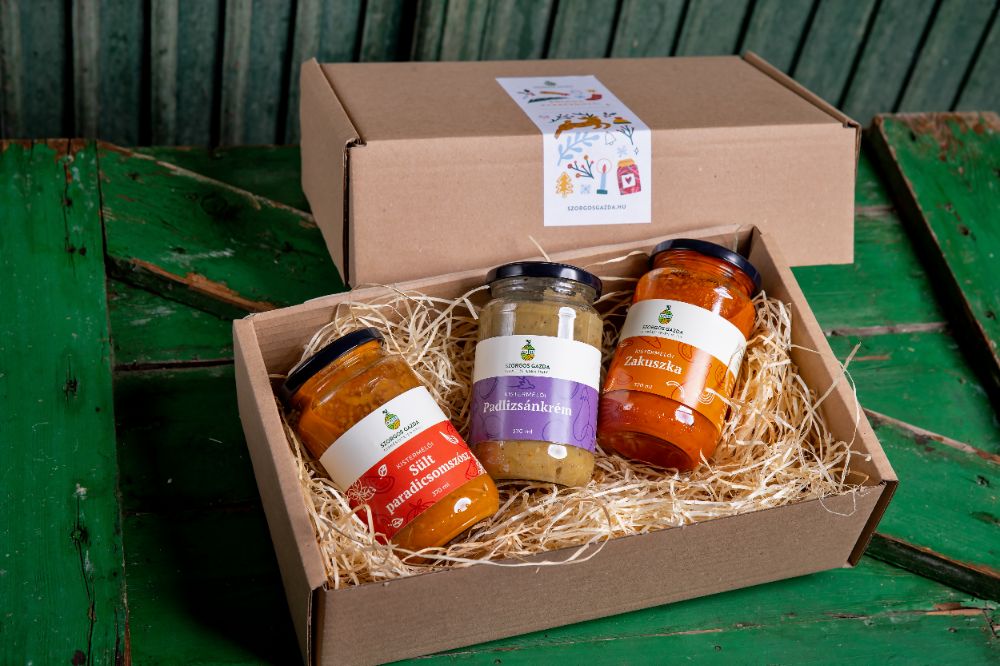
But they don’t just bring the goods to the customers – they also open the doors of their homes. Several times a year they hold Open Door events so that anyone, who is curious about their farming can get a taste of this way of life. They talk about their successes and challenges and show the beauty of farm life.
Their story is not just about them. Every customer, every visitor, who plants a seed at home or opens a jar of homemade jam is part of the dream that was born six years ago. That seed – shared care, attention and love – is what can create a better, more sustainable future for us all.
SUCCESS FACTORS
Sustainable farming practices: They use crop rotation and biological methods to protect against pests. This approach ensures long-term soil health, reduces the use of chemicals, and promotes environmentally friendly farming practices. This sustainable approach not only benefits the environment but also helps produce healthier and more flavourful products.
Value addition through processing: By processing their leftover products into pickles, syrups, jams, vegetable creams, and other products, they reduce waste and increase the value of their produce. This creates diverse product offerings, providing customers with a variety of options and ensuring better utilization of their harvest.
Commitment to natural products: They prioritize offering products without preservatives, which appeals to health-conscious customers. This commitment to natural and preservative-free products helps build trust and loyalty among consumers, who value wholesome, unprocessed foods.
Direct market engagement: They sell their products directly at the markets, allowing them to have a hands-on approach to customer relations. This direct engagement fosters stronger connections with consumers and provides valuable feedback that can be used to improve products and services.
Local and regional presence: They have established a presence in multiple locations, both within Budapest and outside the capital, by attending four key markets. This geographic diversification allows them to reach a broader customer base and enhances visibility, increasing brand recognition.
Adaptation to seasonal availability: Their commitment to seasonal production ensures that customers receive the freshest products at their peak quality. By only offering crops when they are in season, they maintain product quality and avoid the drawbacks of out-of-season produce, setting them apart from businesses that may offer products year-round at the expense of quality.
Waste minimization and efficiency: By transforming leftover market products into processed goods, they effectively minimize waste and ensure maximum use of their resources. This approach contributes to sustainability and profitability by turning what might have been discarded into valuable products.
Own brand: Creating and building your own brand is always a long process, but it is worth the effort because a well-built brand, covering healthy and high-quality products, will attract customers back again and again, creating a large and loyal customer base.



